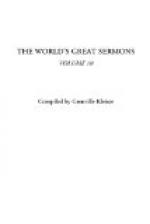The perfect ideal for my life, then, is that I live always in the realm of the things that please God; and the secret by which I may do so is here unfolded—by living in perpetual, unbroken communion with God: communion with which I do not permit anything to interfere. Then it shall be possible for me to pass into this high realm of actual realization.
It is important that we should remind ourselves in a few sentences that the Lord has indeed stated the highest possible ideal for human life in these words: “The things that please him.” Oh, the godlessness of men! The godlessness that is to be found on every hand! The godlessness of the men and women that are called by the name of God! How tragic, how sad, how awful it is! because godlessness is always not merely an act of rebellion against God, but a falling-short in our own lives of their highest and most glorious possibilities.
Here is my life. Now, the highest realm for me is the realm where all my thoughts, and all my deeds, and all my methods, and everything in my life please God. That is the highest realm, because God only knows what I am; only perfectly understands the possibilities of my nature, and all the great reaches of my being. You remember those lines that Tennyson sang—very beautifully, I always think:
Flower in the crannied wall,
I pluck you out of the crannies;—
Hold you here, root and all,
in my hand,
Little Flower—but
if I could understand
What you art, root and all, and all in
all,
I should know what God and
man is.
Beautiful confession! Absolutely true. I hold that flower in my hand, and I look at it, flower and leaves and stem and root. I can botanize it, and then I tear it to pieces—that is what the botanist mostly does—and you put some part of it there, and some part of it there, and some part of it there. There is the root, there the stem, and there are the leaves, and there is everything; but where is the flower? Gone. How did it go? When did it go? Why, when you ruthlessly tore it to bits. But how did you destroy it? You interfered with the principle that made it what it was—you interfered with the principle of life. What is life? No man can tell you. “If I could but know what you are, little flower, root and all, and all in all,” I would know what life is, what God is, what man is. I can not.
Now, if you lift that little parable of the flower into the highest realm of animal life, and speak of yourself—we don’t know ourselves; down in my nature there are reaches that I have not fathomed yet. They are coming up every day. What a blest thing it is to have the Master at hand, to hand them over to Him as they come up, and say, “Lord, here is another piece of Thy territory; govern it; I don’t know anything about it.” But there is the business. I don’t know myself, but God knows me, understands all the complex relationships of my life, knows how matter affects mind, and physical and mental and spiritual are blended in one in the high ideal of humanity. Oh, remember, man is the crowning and most glorious work of God of which we know anything as yet. And God only knows man.




